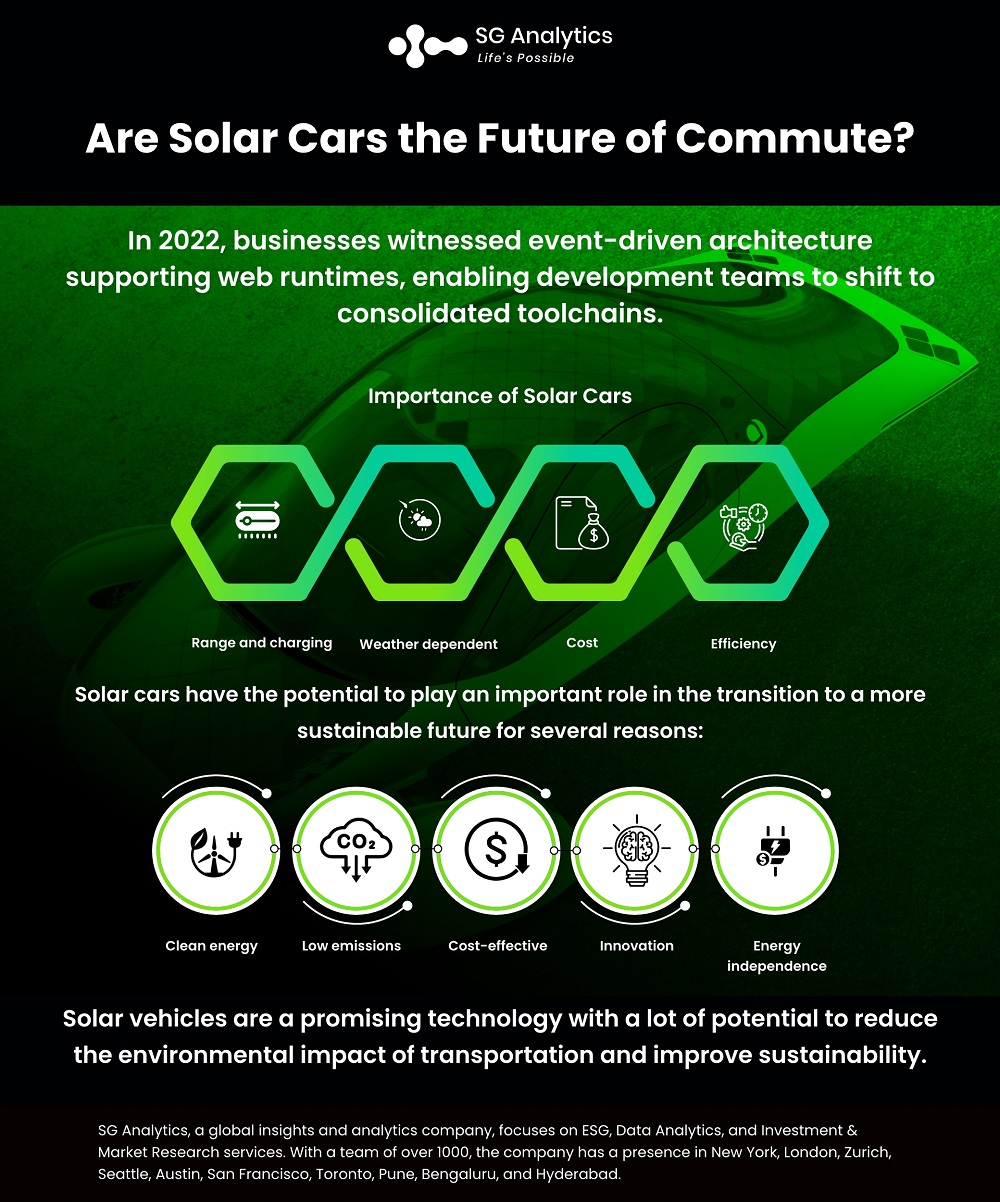As time goes on, it becomes increasingly clear that conventional internal combustion engines are losing ground in the automotive sector to more advanced kinds of propulsion. Vehicles fuelled by hydrogen or rapeseed oil are becoming increasingly common, while electric cars are flooding the market. And the concept of a solar-powered automobile is soon to advance beyond the prototype stage.
Solar cars are vehicles that are powered by the energy from the sun, using photovoltaic cells to convert solar energy into electricity. These cells are typically mounted on the surface of the car and are used to charge a battery which powers the electric motor. Solar powered cars are still a relatively new technology, and they are not yet widely available for purchase by the general public. However, they have been used in a number of racing events around the world, and some companies and research organizations are working on developing solar powered cars for use as everyday transportation. They have the potential to significantly reduce greenhouse gas emissions and the use of fossil fuels, and they are both extremely efficient and environmentally beneficial.

Lighter than electric cars
The main benefit of solar-powered cars is their light weight. Today's most popular electric vehicles use batteries designed to maximize range, allowing their drivers to spend less time at charging stations and more time on the road. But these batteries not only add to the automobiles' carbon impact during manufacturing but also make them heavier and dependent on charging infrastructure. The solution to this conundrum is solar-powered automobiles.
Currently, solar-powered automobiles are far too expensive for widespread use. To put it simply, not yet. Since there is a lot of technological development occurring in this area as well. Higher speeds and greater distances will be possible in the future as panel efficiency increases. Solar-powered automobiles may be a viable option in the not-too-distant future, although that is yet uncertain. Lastly, electric vehicles have also advanced rapidly in recent years.
Sustainability cars and Green energy cars
Sustainability in cars refers to the design, production, and use of vehicles that have a minimal environmental impact. This includes the use of alternative fuels, such as electricity, hydrogen, and biofuels, as well as the use of lightweight materials and energy-efficient systems in the car itself. Additionally, sustainable car production methods, such as recycling and using environmentally-friendly manufacturing processes, are also important.

Sustainability in the context of cars refers to the environmental and social impact of the production, use, and disposal of vehicles. This includes factors such as emissions, fuel efficiency, use of renewable resources in production, and end-of-life disposal. There are several ways that cars can be made more sustainable, including:
-
Electric vehicles (EVs) and hybrid vehicles, emit less pollution and have lower lifecycle greenhouse gas emissions than traditional gasoline-powered cars.
-
Developing sustainable biofuels, such as ethanol and biodiesel, which are made from renewable plant materials and can reduce dependence on fossil fuels.
-
Improving fuel efficiency through technologies such as aerodynamics, lightweight materials, and advanced powertrains.
-
Implementing programs to promote car-sharing, biking, and public transportation as alternatives to private car ownership.

-
Designing cars to be easily recyclable and reducing the use of hazardous materials in production.
-
Increasing the use of sustainable materials in the production of vehicles and their components, such as recycled plastics and bamboo.
-
Developing ways to improve the energy efficiency of the manufacturing process.
-
Improving the fleet's life-cycle performance in order to extend its serviceable life and reduce the need for replacement. Maximizing safety and crash performance to minimize social impact.
Importance of Solar Cars
Solar powered cars have the potential to be a significant part of the future of transportation, but they may not fully replace traditional gasoline-powered cars as the primary mode of commute for everyone due to several reasons:
- Range and charging: Solar cars currently have a limited range compared to gasoline-powered cars and require more time to charge. This makes them less suitable for long-distance travel or for people with limited access to charging stations.

- Weather dependent: The performance of solar cars is dependent on weather conditions, particularly on the availability of sunlight. This can limit their usability in certain regions or during certain seasons.
- Cost: The cost of solar cars is still relatively high compared to gasoline-powered cars; this could be a barrier to widespread adoption.
- Efficiency: The current technology has been able to increase the efficiency of solar cells. However, it is still less efficient than combustion engines, which in turn, limits the capabilities of the car.
Why are solar cars important for the future?
Solar powered cars are important for the future because they have the potential to reduce dependence on fossil fuels and decrease greenhouse gas emissions. They can also be a source of clean and renewable energy. Additionally, the development and use of solar cars can drive innovation in the automotive industry and lead to the creation of new technologies and job opportunities. The use of solar cars can also have a positive impact on air quality and public health by reducing pollution from traditional gasoline-powered vehicles.

The value of the global solar-powered vehicle market is expected to increase from $90.3 million in 2022 to $288.4 million by the end of 2032, growing at a CAGR of 12.3 percent. Solar cars have the potential to play an important role in the transition to a more sustainable future for several reasons:
- Clean Energy: Solar cars are powered by energy from the sun, a renewable and sustainable resource. This means they do not rely on fossil fuels, which are a finite and polluting resource.
- Low emissions: As a result of not relying on fossil fuels, solar cars have zero emissions, which helps to reduce air pollution and lower the overall carbon footprint.
- Cost-effective: As the technology of solar panels and solar vehicles improves, the cost of producing solar cars will likely decrease, making them more affordable for more people.
- Innovation: The development of solar cars can lead to advancements in technology and engineering, creating new opportunities for research, design and job creation.
- Energy independence: Solar cars can reduce dependence on foreign oil and create more energy independence for countries.
Portable power: some solar cars are also equipped with foldable solar panels, giving them the ability to generate electricity when parked in sunlight, which could be a portable power source.
Also Read - How Businesses Can Improve Their Sustainability Performance With ESG.

Conclusion
Solar-powered cars have the potential to greatly improve our environment and energy independence while also driving innovation and job creation.
However, solar cars can play a complementary role in the future of transportation. They can be useful for short-distance commutes or for specific situations where a zero-emission, low-noise, and renewable mode of transportation is desirable. For example, solar cars can be useful for urban commutes, for use in areas with poor air quality, for use in car sharing or ride-hailing services, and for use in off-grid locations.
The total value of the worldwide solar vehicle market was estimated at USD 228.1 mn in 2019, growing at a CAGR of 18.1% to reach USD 689.5 mn by 2027. Overall, solar vehicles are a promising technology with a lot of potentials to help reduce the environmental impact of transportation and improve the sustainability of our transportation systems.
With a presence in New York, San Francisco, Austin, Seattle, Toronto, London, Zurich, Pune, Bengaluru, and Hyderabad, SG Analytics, a pioneer in Research and Analytics, offers tailor-made services to enterprises worldwide.
SG Analytics is an industry leader in ESG services, providing custom sustainability advice and research to aid in deliberation. If you are looking for an effective ESG integration and management solution provider to improve your company's long-term viability, get in touch with us today.









